- Home
- Andrew Beery
Battleborn
Battleborn Read online
Battleborn #1 (v1)
Copyright 2019 by Andrew Beery
Prequel to Battleborn
Note to reader: Prequel to Battleborn takes place 568 years before the actual Battleborn Saga. Many of the characters and events will be familiar if you have read my Boneyard Dog series. Prequel to Battleborn takes place in the same universe. It sets the stage for Battleborn and builds a bit of the backstory. If you wish to jump straight into the main story feel free to do so by tapping here.
My name is Admiral Jeremy Riker… the original. I have a brother by the same name. That’s because he’s an illegal clone; created by an alien race who needed a leader for an interstellar war that they were in the process of losing. I guess I should be honored. As odd as it might sound, I miss him, but that’s another story entirely, best told at another time.
As for the here and now, I’m the commander of record of the United Earth Ship Diaspora. We fled our solar system some sixty years ago during an invasion that threatened the very existence of humanity. We lost contact with Earth after we escaped. I fear we may be the last of our kind.
My mission is to find a home for the remnants of Humanity. We’ve seeded two worlds along the way. Our third and final colony is being established as I write this… a beautiful, blue water world we’ve named Azul.
Chapter 1: Azul
“Mister Hampton, give me some good news,” I ordered.
“Good news it is Admiral,” the newly minted ensign replied. “There are four class-m planetary bodies in the Goldilocks zone. Two are moons orbiting a gas giant and two,” he began with undeniable excitement in his voice, “are almost identical in size to Earth. And Sir… They are orbiting a common barycenter!”
I smiled. The exuberance of youth. My wife, Lori, would have shared the young man’s excitement. The years had hardened me, however. Where Ensign Hampton saw adventure and opportunity, I saw the potential for a threat. Four habitable worlds meant four places within this solar system that might harbor a challenge to a fledgling colony.
The hairs on the back of my neck were standing up. Whether this was because of an actual threat or my hypersensitivity… a result of the mistakes I had made some twenty years ago… I couldn’t say.
I toggled the comms and spoke to our ship’s AI. The self-aware, alien artificial intelligence had been created by a hyper-advanced race called the Jabesh eons before any human had taken his or her first breath.
“Recommendations, Arquat?” I asked. I knew the AI had been monitoring activities on the bridge. Normally, I would have involved my First Officer in the conversation, but she had stepped off the bridge to deal with an emergency in Engineering.
“Proceed with caution, Admiral,” he responded in his stilted almost-British voice. “The ship’s systems remain degraded and are at only 72%. You are not in a position to engage in a prolonged confrontation should one occur.”
“Tell me something I don’t know,” I said as I shifted in my command chair. At 102, my bones ached no matter how I repositioned myself. I felt every bit as worn out as the ship. Years of rough living had taken its toll on both of us.
The holographic image of the Jabesh AI materialized near me. It was silly, but he was a welcome sight. After the death of my wife around twenty years ago, he had become my best friend. Sometimes though, he was frustratingly unhelpful.
He was not the original Arquat. He had been cloned like I had. This version resided in the Diaspora’s computer core, which was not as spacious as the AI’s original Jabesh-built home. In real-world terms, this meant he had the barest fraction of the computational power of his progenitor. In practical terms, he was still far more powerful than any AI built by either humanity or any member of the former Galactic Order.
“JD,” Arquat said softly, “neither this ship nor you are capable of many more jumps into Skip Space. You must explore this system… whatever your reservations… but you must do so cautiously.”
I nodded. I knew my synthetic friend was right. I had been running scared and second-guessing myself long enough.
“Mister Hampton, are there any signs of active technology in use? Any radio waves; indications of industrial smog; orbiting satellites?”
“Negative, Admiral. Nothing active on the scans. I’ve started checking the stable Lagrange points. So far, there are no signs of artificial debris collected. I think the system is clean, sir.”
That was a good first indication, but I knew the Ensign’s assessment was far too hastily arrived at. The hairs on the back of my neck were still on high alert. I had learned to trust them over the course of my all-too-long life.
“Ok,” I said, “but let’s proceed under the trust-but-verify mode of operation.”
I turned to the left. Both my helmsman and my navigator were awaiting my orders.
“Helm, proceed at one-quarter impulse to one of those habitable worlds. Mister Hampton will provide you with the target coordinates.”
In less than a second, the aforementioned coordinates arrived at his station.
“Setting course now,” the navigator acknowledged.
“Course locked. Engaging sublight engines at one-quarter power,” the helmsman confirmed. “ETA: five hours and forty-six minutes.”
I knew without even asking that our newest ensign had picked one of the barycenter worlds. It’s what I would have done in my younger and more foolish age.
I hit my comms one more time.
“CAG, this is the Admiral. Dust off your Warthogs. We are approaching a candidate world for colony three. I want your birds in the air providing close cover in a little over five hours.”
Commander McDill answered immediately.
“Roger that, Admiral. The birds may be old, but they are never dusty. Are we expecting trouble?”
“Negative, Ray. Just a preponderance of caution from an old, battle-weary Admiral. It’s probably going to be nothing more than a chance for your people to get actual flight hours in. Got to be better than simulator time.”
“Works for me, Admiral…”
There was a brief pause. I thought my CAG was going to say more. Turns out I was right.
“Sir, I was thinking of giving Ted command of the mission. Are you going to be OK with that?”
Ted was my son. As a matter of interest, Lori and I had our one and only child when we turned seventy. This was somewhat rare, but our duties kept us busy and raising a child takes a time commitment we were reluctant to make. After much debate, Lori and I finally decided, even at that advanced age, we needed to contribute to the genetic legacy and diversity of humanity.
In truth, Galactic Order technology made having a child at any age as simple as using stem cells to create an embryo and transferring said embryo to a gestation chamber to bring the child to term.
In my mind, bringing Ted into the world was the best decision Lori and I had ever made. The next few years were among the happiest in my life. Even today, when I need to center myself, it is to these memories I go. Sadly, those good years were all too fleeting.
Ted was twelve when his mother died. Things had been rough for a while. He blamed me for his mother’s death. Hell, I blamed me for his mother’s death.
Eventually, Ted went to live with his great uncle from the Spratt side of our family. I tried to remain close, but Ted was a willful child and made it painfully clear he wanted little to do with the man who had made the hard choice that resulted in the loss of a shuttle and the people on it… including Lori.
It’s said that time heals all wounds. I’m not sure that I believe that, but in this case, it turned out to be true… although it had taken a while. In the last three or four years, my son and I had grown close again.
The CAG coughed politely into the comm. It seems I had been silent for almost a minute
. I shook my head to clear the cobwebs. My mind tended to drift more of late.
Refocusing, I asked, “Is he ready?” with more than a little concern.
Flying a combat fighter was always a dangerous job. Even more so when the A-901c warthog you were flying was twice your age and a testament to what could be accomplished with duct tape, bubble gum, and a prayer.
I wasn’t worried for Ted… he was one hell of a pilot. I was worried about what would happen if he lost somebody due to something as silly as equipment failure.
“Respectfully, sir, I wouldn’t be asking if I didn’t think he was.”
“That’s all I needed to hear CAG. The call is yours. Get your birds fueled up and ready to run close air support. Riker out.”
The next five hours and forty-some minutes were not all that noteworthy. The Diaspora had run more planetary assessments than I could remember. The only thing that made this one noteworthy was those system failures, and dwindling resources meant that this would need to be one of the last… if not the last. Bluntly put, the Diaspora was on her final leg.
Oh, if we had access to a space dock and proper fabrication facilities the ship could be overhauled and brought back to pristine condition, but the reality was we had none of those.
“Approaching orbital insert,” the helm reported.
“Standard orbit, if you please.”
“Acknowledged, Admiral. Standard orbit.”
“Mister Hampton, run a full sensor sweep. What is our away team going to find down there?”
“Aye aye, sir.”
On first inspection, the planet was beautiful. Clear blue waters surrounded lush green continents. The poles contained ice caps that reminded me of the ones Earth used to have before man’s hubris destroyed them. In short, the planet seemed pristine.
“Scans coming in now, Admiral,” the ensign reported. “Nitrogen-Oxygen atmosphere –a touch lean at 18.4% O2 but well within human tolerances. Gravity 0.98 Earth normal. Abundant plant life. No large land animals detected, but with so much vegetation it's hard for the sensors to get a comprehensive reading.
“This is odd,” Hampton said after pausing for a moment.
My neck hairs did their thing.
“Let’s be a little more specific, Ensign. What’s odd?”
“Ah… yes, sir. Sorry, sir. Sir, the ground-level radiation is strangely variable. Regions near some of the coastlines are reading 390 rems per hour while most areas are in the 6 to 7 hundred millirems per year range. The hot spots would kill an unprotected person in under an hour while other places… most of the planet, in fact, is essentially Earth normal.”
I had a really bad feeling about this.
“Scan for metals near the hot spots,” I said.
“Scanning now,” the young man acknowledged.
In a moment, my fears were confirmed.
Hampton leaned back in his chair and turned to face me.
“Sir, there is a much higher concentration of highly refined iron, tungsten, copper, and nickel near each of the hot zones... How did you know?”
Rather than answering, I glanced at Arquat.
“Timeframe?”
The AI paused for a second.
“Based on the ensign’s sensor data and the known rates of fissionable decay, I would estimate something on the order of eighty to one hundred and twenty thousand years. In planetary time scales… this happened yesterday.”
“Ensign, launch a full set of reconnaissance probes. I want low-level sweeps of the planet, especially the hot zones.”
I saw the continued looks of confusion on the younger faces of the bridge crew. I shook my head in disgust… not at them but for the tragedy that had befallen this planet.
“War, ladies and gentlemen. Complete and absolute war.”
2100.2019.0520 Galactic Normalized Time
Deep in the bowels of a long dead moon, an ancient intellect awoke. Apep had been asleep since its masters had fled this star system untold millennia ago. A radio signal that was deemed to be of intelligent origin had been detected and had triggered the reactivation sequence. The great machine’s once exhaustive interplanetary sensor network was inexplicitly silent. With no other choice, it began the laborious task of excavating a tunnel to the surface.
Chapter 2: Mudball
“Is a mystery, da?” Doctor Abelard said after examining the probe data.
The German scientist was the only member of the Diaspora’s crew who was actually older than I was. He was a biologist and probably had the distinction of having seen more alien life on more worlds than any biologist in this history of humanity.
The mystery in question was a simple one. Where were the people? Nuclear war was a horrific event, but even the worst conceivable war would have left some survivors.
Arquat was of the opinion that the nuclear aspect of this ancient war was only one piece of the fuller extent of the conflict. The war may, in fact, have been what scholars called a ‘total war’ in which the goal was not merely victory but rather the complete and utter annihilation of the opponent. In other words, genocide on a planetary scale.
If Arquat was right, in addition to using nukes, the aggressors might have brought other weapons into play. Weapons like biological warfare and/or environmental sabotage. It was almost impossible to tell at this point, but whatever it was… it had been tragically effective.
The commander of my Marines, Jamie Engel, scratched his bearded chin.
“Whether there was genocide involved in whatever happened to the inhabitants of this planet or not, do we need to be concerned about it? The hot zones are well defined. Any environmental factors seem to have resolved themselves long ago. As the good doctor has said, the biosphere seems stable and perfectly adapted for humanity.”
Latonda Mercer sipped her coffee. The head of Medical onboard the Diaspora and her coffee cup were inseparable. There was a rumor, unverified but certainly plausible, that as a surgeon she even operated with said cup in attendance.
“It’s highly unlikely that any pathogens on the planet are going to have any impact on us. We’ll check, of course.”
I nodded. I had expected as much.
“Folks, there is one issue we need to address. Who were they fighting and more importantly, are they still around?”
My senior staff and I debated the issue and how best to address it for the better part of the next hour. It was exhausting, and I needed a nap. At 102, I didn’t have the stamina I had when I was only eighty.
“OK, our two orders of business are to do a preliminary survey of Azul while the Diaspora takes a closer look at the sister planet. Doctors,” I was looking at both Mercer and Abelard, “how long will it take you to get your teams ready?”
Both laughed.
“Admiral, we’ve been ready since we entered orbit,” the two answered. “We just need you to give us the word.”
I looked over at Jamie. He nodded. Apparently, the Marines were ready too.
“Consider the word given. Commander Engel, you will be in command. Inform the CAG I want two warthogs detailed to support your operation.”
***
The bridge of the Diaspora was atypically quiet. We were breaking orbit. On the planet’s surface, we had left well over one hundred personnel, as well as equipment from six different departments. Their job was to make a determination as to whether or not Azul was suitable for our final colony.
The Diaspora, meanwhile, was setting a course for Mudball. That was the name given to the sister planet in this unusual binary planet system. It was approximately the same size as Azul, and while it had an abundance of water, the planet seemed to be 70% desert, which gave it a decidedly brown color from space.
The trip took less than fifty minutes. We could have done it sooner, but engineering was having trouble keeping one of our two remaining fusion reactors from scramming every ten to fifteen minutes. Like with everything else on the ship, it seemed you could only push duct tape, bubblegum, and prayers so far.
“Entering orbit around Mudball,” Ensign Hampton reported.
“Very good.”
I turned to Commander Tanny Mumba, my First Officer.
“Tanny, let’s get some probes down there and see what we’re dealing with.”
As always, she was ahead of me.
“Probes already launched, sir. Telemetry from the surface should be arriving in sixteen minutes.”
I smiled. Tanny was more than a First Officer. She was of that rare breed of person that puts friendship, duty, honor, and integrity before personal self-interest.
I had tried to promote her to Captain and give her command of the Diaspora more times than I could count. God knows she deserved a command. Nevertheless, she always refused the promotion. I suspect she understood that, for me, there was no beach to walk on. Retirement would be a death sentence. That was something she could not… would not accept.
I looked at the time-ravaged bridge. I couldn’t help but think, ‘This vessel… I give, she takes. She won't permit me my life; I've got to live hers.’ And yet in my heart, I knew that this too would be coming to an end soon… sooner in fact than any of us imagined.
“Give me a full sensor sweep. Let’s see what we can learn before our probes fill in the gaps.”
No sooner had the words gotten out of my mouth than Arquat’s holographic image flickered and disappeared. A fraction of a second later, the lights died and the grav-plating failed. It was pitch black.
I found myself floating out of my command chair. Soon I had no idea about my orientation relative to the ceiling or the floor.
Tanny started barking commands in the darkness. First, she ordered everybody to strap in with their safety harnesses. These were built into the seats. I was getting slow because I had forgotten they were even there. It had been years, maybe even a decade since we’d had to use them.
Next, she ordered Erickson to pull the chem-lights from the first-aid panel to his immediate left.
Several things worried me as the first of the yellow-green lights illuminated the dark bridge. Why hadn’t the emergency lighting and backup power systems kicked in when main power failed?

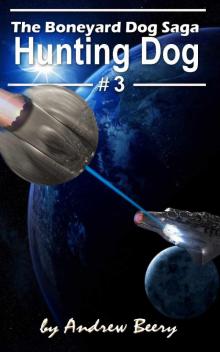 Hunting Dog
Hunting Dog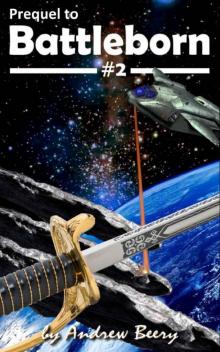 Battleborn 2
Battleborn 2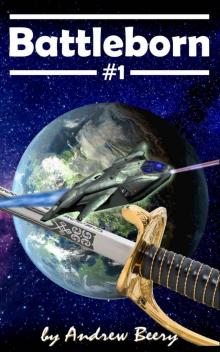 Battleborn
Battleborn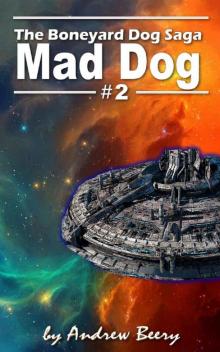 Mad Dog
Mad Dog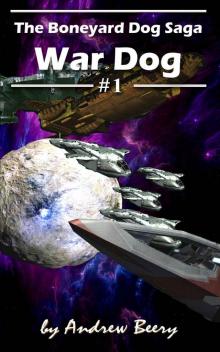 War Dog
War Dog Catherine Kimbridge Chronicles 2: Redemption
Catherine Kimbridge Chronicles 2: Redemption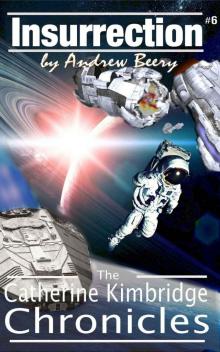 The Catherine Kimbridge Chronicles #6, Insurrection
The Catherine Kimbridge Chronicles #6, Insurrection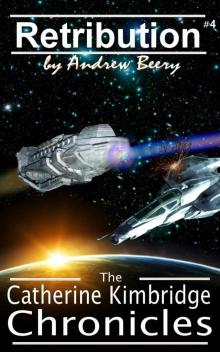 The Catherine Kimbridge Chronicles #4, Retribution
The Catherine Kimbridge Chronicles #4, Retribution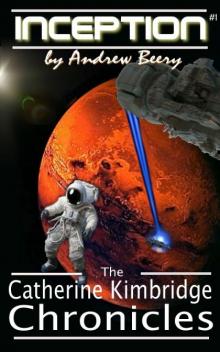 The Catherine Kimbridge Chronicles #1, Inception
The Catherine Kimbridge Chronicles #1, Inception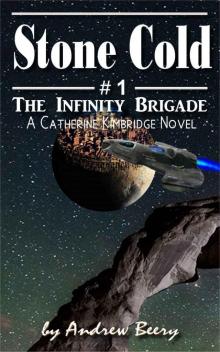 The Infinity Brigade #1 Stone Cold
The Infinity Brigade #1 Stone Cold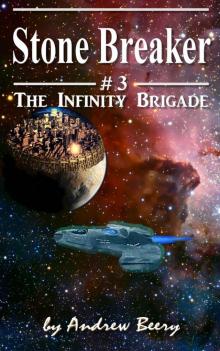 The Infinity Brigade #3, Stone Breaker
The Infinity Brigade #3, Stone Breaker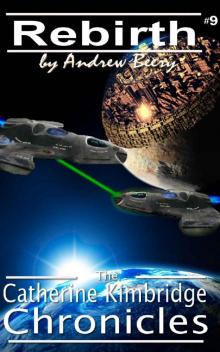 The Catherine Kimbridge Chronicles #9, Rebirth
The Catherine Kimbridge Chronicles #9, Rebirth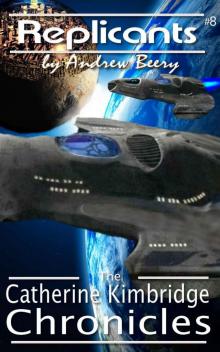 The Catherine Kimbridge Chronicles #8, Replicants
The Catherine Kimbridge Chronicles #8, Replicants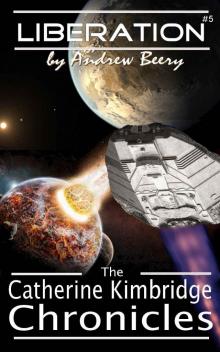 The Catherine Kimbridge Chronicles #5: Liberation
The Catherine Kimbridge Chronicles #5: Liberation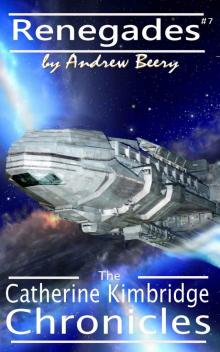 Catherine Kimbridge Chronicles 7: Renegades
Catherine Kimbridge Chronicles 7: Renegades